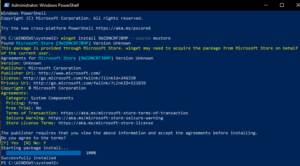Based on below two links I have combined internal temperature senzor with humidity and external temp meter.
Combined code below
https://www.instructables.com/id/Arduino-IOT-Temperature-and-Humidity-With-ESP8266-/
http://navody.arduino-shop.cz/navody-k-produktum/teplotni-senzor-ds18b20.html
Public view at thingspeak.com
https://thingspeak.com/channels/303956
/* Arduino IOT - Temperature (oC) and Humidity (%) on the web
*Use the DHT-22 sensor to read temperature and humidity values
*Send these values to www.thingSpeak.com with the ESP8266 serial Wifi module
Dev: Michalis Vasilakis // Date:23/2/2016 // Update: 25/2/2015 // Ver. 1.3
More info: http://www.ardumotive.com/iot-wifi-temp-and-humidity.html
Tip: open the serial monitor for debugging */
//Libraires
#include
#include
// Teplotní čidlo DS18B20
// připojení knihoven
#include
#include
// nastavení čísla vstupního pinu
const int pinCidlaDS = 4;
// vytvoření instance oneWireDS z knihovny OneWire
OneWire oneWireDS(pinCidlaDS);
// vytvoření instance senzoryDS z knihovny DallasTemperature
DallasTemperature senzoryDS(&oneWireDS);
/*————————DHT SENSOR————————*/
#define DHTPIN 2 // DHT data pin connected to Arduino pin 2
#define DHTTYPE DHT22 // DHT 22 (or AM2302)
DHT dht(DHTPIN, DHTTYPE); // Initialize the DHT sensor
/*———————————————————-*/
/*—————–ESP8266 Serial WiFi Module—————*/
#define SSID „PRAHA“ // „SSID-WiFiname“
#define PASS „jandra76“ // „password“
#define IP „184.106.153.149“// thingspeak.com ip
String msg = „GET /update?key=BP0RDZWQ5N7AYIDD“; //change it with your key…
/*———————————————————–*/
//Variables
float temp;
int hum;
String tempC;
int error;
float tempoutside;
String tempoutsideC;
void setup()
{
Serial.begin(115200); //or use default 115200.
// zapnutí komunikace knihovny s teplotním čidlem
senzoryDS.begin();
Serial.println(„AT“);
delay(10000);
if(Serial.find(„OK“)){
connectWiFi();
}
}
void loop(){
// načtení informací ze všech připojených čidel na daném pinu
senzoryDS.requestTemperatures();
// výpis teploty na sériovou linku, při připojení více čidel
// na jeden pin můžeme postupně načíst všechny teploty
// pomocí změny čísla v závorce (0) – pořadí dle unikátní adresy čidel
Serial.print(„Teplota cidla DS18B20: „);
Serial.print(senzoryDS.getTempCByIndex(0));
Serial.println(“ stupnu Celsia“);
tempoutside= senzoryDS.getTempCByIndex(0);
// pauza pro přehlednější výpis
delay(500);
//Read temperature and humidity values from DHT sensor:
start: //label
error=0;
temp = dht.readTemperature();
hum = dht.readHumidity();
char buffer[10];
// there is a useful c function called dtostrf() which will convert a float to a char array
//so it can then be printed easily. The format is: dtostrf(floatvar, StringLengthIncDecimalPoint, numVarsAfterDecimal, charbuf);
tempC = dtostrf(temp, 4, 1, buffer);
tempoutsideC = dtostrf(tempoutside, 4, 1, buffer);
updateTemp();
//Resend if transmission is not completed
if (error==1){
goto start; //go to label „start“
}
delay(60000); //Update every 1 hour
}
void updateTemp(){
String cmd = „AT+CIPSTART=\“TCP\“,\““;
cmd += IP;
cmd += „\“,80″;
Serial.println(cmd);
delay(2000);
if(Serial.find(„Error“)){
return;
}
cmd = msg ;
cmd += „&field1=“; //field 1 for temperature
cmd += tempC;
cmd += „&field2=“; //field 2 for humidity
cmd += String(hum);
cmd += „&field3=“; //field 3 for temperature outside
cmd += tempoutsideC;
cmd += „\r\n“;
Serial.print(„AT+CIPSEND=“);
Serial.println(cmd.length());
if(Serial.find(„>“)){
Serial.print(cmd);
}
else{
Serial.println(„AT+CIPCLOSE“);
//Resend…
error=1;
}
}
boolean connectWiFi(){
Serial.println(„AT+CWMODE=1″);
delay(2000);
String cmd=“AT+CWJAP=\““;
cmd+=SSID;
cmd+=“\“,\““;
cmd+=PASS;
cmd+=“\““;
Serial.println(cmd);
delay(5000);
if(Serial.find(„OK“)){
return true;
}else{
return false;
}
}


